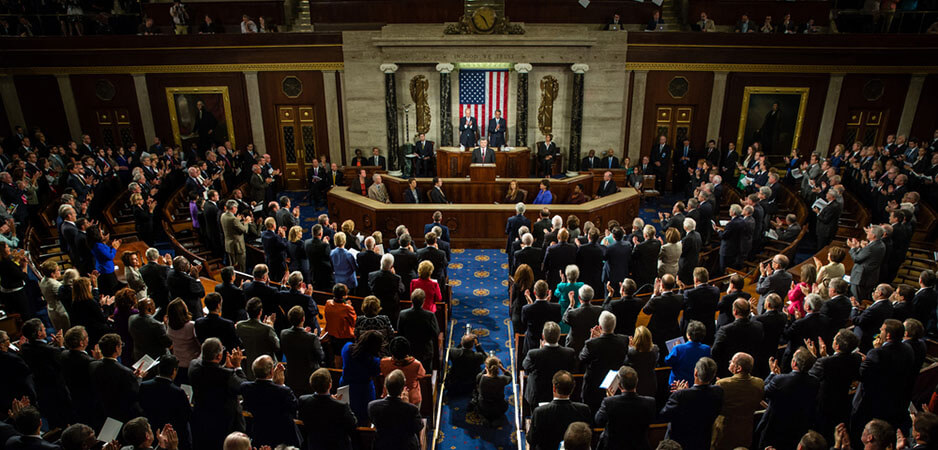Deep divisions and nonstop elections have destroyed any sense of common purpose or long-term thinking in the US.
Earlier this month, US President Donald Trump celebrated his first year in office with a shutdown. The federal government closed for business at 12.01 am on January 20 and reopened on the evening of January 22 after the Senate passed a bill to fund it till February 8. Both Republicans and Democrats blamed each other for the shutdown.
It is important to note that Republicans form majorities in both chambers of Congress, the House of Representatives and the Senate. Never before has a shutdown occurred when the same party controls both chambers of Congress. It turns out that Republicans needed Democrats to pass a spending bill because of dissension in their ranks. Four senators of the Grand Old Party (GOP) refused to toe the party line, and Democrats joined them to close down the federal government.
Government shutdowns do not mean that military, intelligence or police operations stop. It means that nonessential federal workers are furloughed, which means they are sent on compulsory leave and not paid. Among other things, working at national parks or monuments, processing passport or visa applications, and maintaining government websites are deemed nonessential. In 2013, the 16-day shutdown cost a mere $2 billion.
CHASMS DEEP AND WIDE
At the heart of the most recent shutdown were disagreements over young immigrants, children’s health care and military spending. These divisions run deep as the charged 2016 election campaign amply demonstrated.
In September 2017, Trump announced that he would end Barack Obama’s Deferred Action for Childhood Arrivals (DACA) program on March 5 unless Congress acted to extend it. DACA protects more than 700,000 undocumented immigrants who entered the US as children. Obama’s measure gives these immigrants, known as “Dreamers,” temporary legal status. Democrats aim to protect DACA and to allow Dreamers to remain in the US. Many Republicans want to kick them out.
Trump and most of his fellow Republicans want to boost defense spending significantly. They also want more money for tough new border controls, including the proposed US-Mexico wall. Fiscally conservative Republicans opposed increased spending and oppose Trump & Co. Democrats are willing to cut a deal with the Republicans as long as the increase in defense spending is matched by an equal boost in domestic spending. They also want the Republicans to extend DACA and let Dreamers stay in the US. Such have been the divisions that Congress has not been able to agree upon a long-term budget deal. Instead, lawmakers have been passing stopgap spending bills known as continuing resolutions, ensuring that the land of the free and the home of the brave stays in a perpetual state of crisis.
Not only has Congress been unable to agree upon a budget deal, but it has also failed to reauthorize the Children’s Health Insurance Program (CHIP). The GOP leaders tried to entice the Democrats to vote for a stopgap spending bill by attaching a six-year reauthorization for CHIP to it. The Democrats refused to abandon Dreamers and damned the Republican reauthorization of CHIP as “a bowl of doggy doo, putting a cherry on top, and calling it a chocolate sundae.”
THE NINTH SHUTDOWN SINCE 1980
The US is the only superpower on planet Earth with Harvard, Stanford, Facebook, Google, Apple, Amazon, McKinsey and Goldman Sachs flying its pennants high in markets worldwide. Yet this mighty power not infrequently fails to pay for its government on time. In the 21st century, shutdown politics have become par for the course for the land of the Augusta National Golf Club.
 Part of the reason for shutdown politics is the long-cherished Republican belief in small government. Since Ronald Reagan promised to get “government off the backs off the people,” Republicans have sought to slash regulations, cut taxes and limit the role of government. A shutdown ensures government does less and is not that unattractive a proposition for the GOP. The Democrats, who believe in a bigger role for the government, have so far shied away from pulling the trigger and causing shutdowns. This time, though, they emulated their Republican counterparts if only just for a weekend.
Part of the reason for shutdown politics is the long-cherished Republican belief in small government. Since Ronald Reagan promised to get “government off the backs off the people,” Republicans have sought to slash regulations, cut taxes and limit the role of government. A shutdown ensures government does less and is not that unattractive a proposition for the GOP. The Democrats, who believe in a bigger role for the government, have so far shied away from pulling the trigger and causing shutdowns. This time, though, they emulated their Republican counterparts if only just for a weekend.
Under Bill Clinton and Barack Obama, the shutdowns lasted longer and the battle lines were clearer. Each time, Democrats and Republicans battled over the size and cost of government. Simply put, the former wanted to spend more and do more, while the latter wanted the opposite. In 2013, the Republicans aimed to deny money to the Affordable Care Act, known as Obamacare, and shut down the federal government for 16 days to sink Obama’s signature legislation.
This time, there were many actors and more motives involved. Both Republicans and Democrats are divided. The Bush family and the establishment Republicans have been defenestrated by loony gun-toting fanatics like Ted Cruz. Many argue that Trump, the owner of glitzy beauty pageants and garish buildings, has led a hostile takeover of the Republican Party. In turn, the Democrats are divided between the Obama boys, the Clinton cronies and the Sanders socialists. As this author argued in July 2016, “the two-party system is facing a profound crisis.”
Even as the party system flounders, Trump, the master of the art of the deal, is turning out to be more deal breaker than deal maker. Reportedly, he flip flops incessantly, backs out of commitments impulsively and refuses to take much interest in details. Consequently, he has presided over the ninth shutdown despite his party controlling both chambers of Congress.
A VERY AMERICAN HARAKIRI
During the shutdown, each party blamed the other. After the shutdown ended, everyone claimed victory. In the words of Anthony Zurcher of the BBC, everybody is both right and wrong.
This is the year when the midterms are due. This means that congressmen will go to the polls again to win the right to be back at the House of Representatives. The dust has barely settled on the bruising elections of 2016, and the US is already preparing for another argy-bargy at the polls that promises to cost an arm and a leg apart from exacerbating existing deep divisions.
The US now has what Gregor Peter Schmitz calls a mercenary political culture. Every two years, candidates have to raise money and run for office. Ferocious primaries ensure that candidates who evoke visceral emotions and represent well-heeled interests have an advantage. American democracy now encourages demagoguery full of sound and fury. In an election year, the blame game becomes intense and rally-the-base maneuvers inevitable if candidates and parties want to get the vote out.
When the Cold War was in full sway, shutdowns were a rarity. Americans demonstrated both long-term thinking and common purpose on various issues. In 1947, Arthur Vandenberg, a Republican senator, declared that “partisan politics [must stop] at the water’s edge” and supported the foreign policy of Harry Truman, a Democrat in the White House. Today, such is the division in the US that many suspect the president — who belongs to the party of god, guns and low taxes — to be a Russian stooge.
The shutdown was a mere blip, but it could be an omen of things to come. The Republicans are deeply divided and have been unable to pass a budget. The Democrats are equally divided but are trying to keep their flock together by picking a fight with Trump and other Republicans. Süddeutsche Zeitung, a rather prestigious German newspaper, grimly argues that what we are seeing in the US “for a few years now is the self-destruction of one of the world’s oldest democracies.”
Trust in politicians in general and in Washington in particular is running low. Inequality continues to rise and Trump’s tax cuts will worsen this phenomenon. The country’s education system is in crisis with its atrociously expensive top schools turning into mere watering holes en route to venerated corporations such as McKinsey, Google or Goldman Sachs. Even as the National Security Agency continues to spy on its citizens and the Central Intelligence Agency bumps off so-called terrorists in shadowy drone strikes, Amazon, Apple, Facebook and Google know increasingly more about their consumers and profit from exploiting their personal information.
Worryingly, an unprecedented concentration of power is occurring in the US. Arguably, in some ways this concentration of power exceeds that of the Gilded Age of the 1860s or the boom years of the roaring 1920s. Instead of fomenting debate and discussion, this phenomenon has resulted in rage and radicalization. Politicians are appealing to their core constituencies who expect them to block any measure they cannot countenance. In an earlier era, these politicians could have compromised for the greater good of the nation and their constituencies might have forgiven them.
Today, Americans cannot agree upon what is good for the nation. Their political representatives fight for their constituencies fanatically and refuse to compromise even to form a budget or raise the debt ceiling. In this risky game of who blinks first, the solvency of the mightiest country in the world has come into question. Unsurprisingly, the venerable Süddeutsche Zeitung has proclaimed America to be “politically bankrupt.” Thankfully for the country, its president has plenty of experience with bankruptcy.
The views expressed in this article are the author’s own and do not necessarily reflect Fair Observer’s editorial policy.
Photo Credit: Drop of Light / Shutterstock.com
Support Fair Observer
We rely on your support for our independence, diversity and quality.
For more than 10 years, Fair Observer has been free, fair and independent. No billionaire owns us, no advertisers control us. We are a reader-supported nonprofit. Unlike many other publications, we keep our content free for readers regardless of where they live or whether they can afford to pay. We have no paywalls and no ads.
In the post-truth era of fake news, echo chambers and filter bubbles, we publish a plurality of perspectives from around the world. Anyone can publish with us, but everyone goes through a rigorous editorial process. So, you get fact-checked, well-reasoned content instead of noise.
We publish 2,500+ voices from 90+ countries. We also conduct education and training programs
on subjects ranging from digital media and journalism to writing and critical thinking. This
doesn’t come cheap. Servers, editors, trainers and web developers cost
money.
Please consider supporting us on a regular basis as a recurring donor or a
sustaining member.
Will you support FO’s journalism?
We rely on your support for our independence, diversity and quality.






